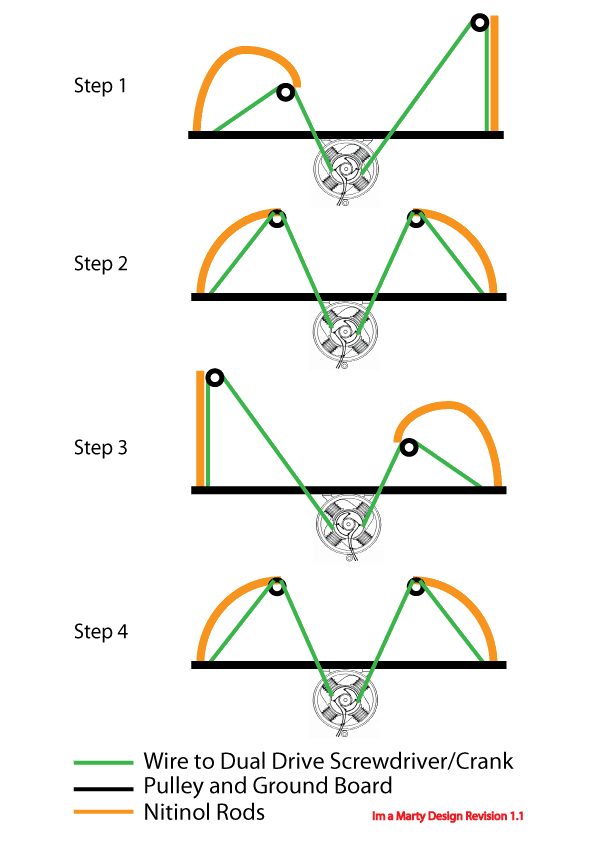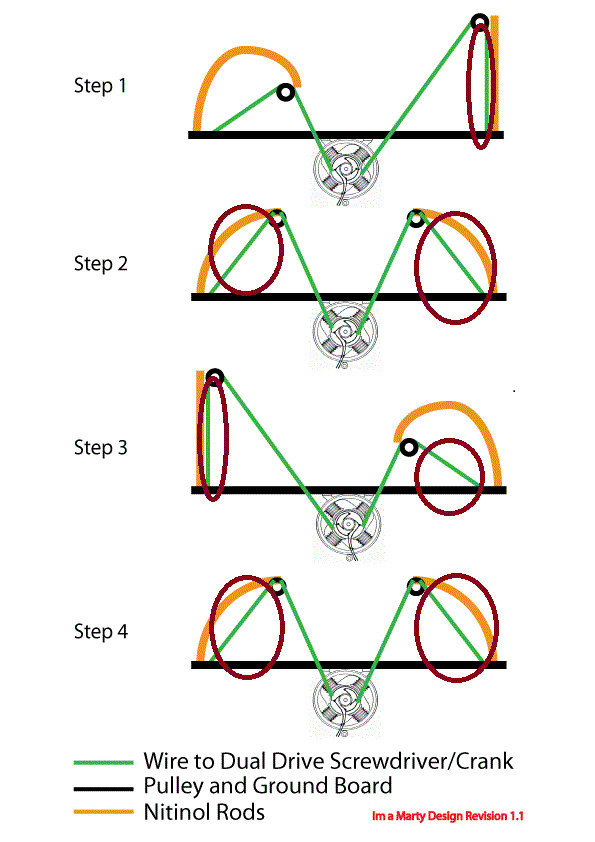It looks like you're using an Ad Blocker.
Please white-list or disable AboveTopSecret.com in your ad-blocking tool.
Thank you.
Some features of ATS will be disabled while you continue to use an ad-blocker.
share:
First I wanted to say that I am hoping this to be a resourceful thread where people can contribute positive information where we can all get together
and make this project happen.
Debunking of course, would be expected, but I am hoping that if you wish to debunk this idea, to do it in a way that can still encourage the design of this project and not make us feel that we should give up because "Its not doable". Get what I mean?
Ok first of all, I came up with this idea half asleep, dozing off and I had to get up otherwise I knew that if I were to go to sleep, I would forget about it.
So I got onto ATS Chat and got speaking with OmegaLogos. OmegaLogos helped me design some basic concepts, working from using certain methods of cooling/warming metal to 'pull' to what we now have, a basic design for the Generator Device.
Today I was fortunate enough to speak to RogueTechie, another ATS Chatter. Within 30 minutes he refined my idea and developed it in AutoDesk Inventor, sent me an image of the refined design and I nearly fell off my chair.
Ok so first of all, what is Nitinol.
Below is a video explaining Nitinol
My design uses Nitinol to Contract/Expand and the ability allows to in turn, power a generator.
Here is my initial design

As you can see the above image shows 4 steps to the design. Please note this was one of the first revisions.
Now as part of the assembly, the shaft is rigged to a Dual Drive Screwdriver. The Screwdriver can turn both ways whilst the piece turns in ONE direction. Here's a video of it.
Now below is the image that RogueTechie Designed

I'll let him explain in detail, however how this device works, is the Nitinol rods are heated via the lenses as it rotates, and cools when the lenses are not passing energy to the nitinol.
The Nitinol Rods expand and contract, turning the Dual Drive Screwdriver which in turn, turns the Generator.
Proof of concept is coming, I gather it will take time to develop this device, but it can be made of any size, depending what you need it for.
We are hoping that the output of energy is more than needed to power the device.
Thanks all for reading
Debunking of course, would be expected, but I am hoping that if you wish to debunk this idea, to do it in a way that can still encourage the design of this project and not make us feel that we should give up because "Its not doable". Get what I mean?
Ok first of all, I came up with this idea half asleep, dozing off and I had to get up otherwise I knew that if I were to go to sleep, I would forget about it.
So I got onto ATS Chat and got speaking with OmegaLogos. OmegaLogos helped me design some basic concepts, working from using certain methods of cooling/warming metal to 'pull' to what we now have, a basic design for the Generator Device.
Today I was fortunate enough to speak to RogueTechie, another ATS Chatter. Within 30 minutes he refined my idea and developed it in AutoDesk Inventor, sent me an image of the refined design and I nearly fell off my chair.
Ok so first of all, what is Nitinol.
Nitinol is mostly half nickel and half titanium. The best part is that you can do all sorts of nifty tricks with it once you know what you are working with.
By applying a heat source to metal wire we can make it spring back into place. We can even make our own shapes with it using the same method.
In order to set a shape to nitinol you need to torch it up to 600 degrees C, once this is done it will always jump back into place with the proper heat.
Below is a video explaining Nitinol
My design uses Nitinol to Contract/Expand and the ability allows to in turn, power a generator.
Here is my initial design

As you can see the above image shows 4 steps to the design. Please note this was one of the first revisions.
Now as part of the assembly, the shaft is rigged to a Dual Drive Screwdriver. The Screwdriver can turn both ways whilst the piece turns in ONE direction. Here's a video of it.
Now below is the image that RogueTechie Designed

I'll let him explain in detail, however how this device works, is the Nitinol rods are heated via the lenses as it rotates, and cools when the lenses are not passing energy to the nitinol.
The Nitinol Rods expand and contract, turning the Dual Drive Screwdriver which in turn, turns the Generator.
Proof of concept is coming, I gather it will take time to develop this device, but it can be made of any size, depending what you need it for.
We are hoping that the output of energy is more than needed to power the device.
Thanks all for reading
reply to post by Im a Marty
Hey Marty, howz you these days? Been busy I see
It's a fantastic idea to get the brains of ATS together and find a way to make this happen, how exciting.
Can't wait for this thread to grow.
S&F
Hey Marty, howz you these days? Been busy I see
It's a fantastic idea to get the brains of ATS together and find a way to make this happen, how exciting.
Can't wait for this thread to grow.
S&F
The energy of the straightening rod A isn't enough to bend the rod B AND turn the generator.
Then, you need energy to heat the rods and some extra gear to control the heat generator, which will cause friction and consume some energy as well.
And it is a very high possibility that the rods will simply break in short time.
Then, you need energy to heat the rods and some extra gear to control the heat generator, which will cause friction and consume some energy as well.
And it is a very high possibility that the rods will simply break in short time.
the concept is intriging , im not bashing just asking, in this concept requiring an initial and i am assuming continous requirment heat source,self
sustaining after startup or external requirment thruoghout?
reply to post by Im a Marty
good base idea, as far as your one way ratcheting device you should take a look at some diagrams of the winding parts of a self winding mechanical wristwatch.there is a few different designs that are very efficient,designed for constant use and longevity. a little gear change-up and i think you could get very positive results.
for the motion part would it not need to be a back and forth motion? (kind of like a see-saw motion one side up one side down.) a while back i was thinking of a similar idea except using motor wire,i think thats what it was called, a coil spring when electricity is applied it will expand remove electricity it will contract,i think thats how it works.
hey after this one i've got a design for a completely plug and play (so to speak) portable wind turbine set-up that i have designed with almost all "off the shelf" parts and have it set up to be sturdy enough for constant use.my thought is it should cover a home with modest electric use.but can be doubbled up for larger homes.its also ment to take care of all of the over complicated problems associated with wind turbines.(i used to work for a wind turbine company)
and the most important advise i can give in such things as this is to follow the K.I.S.S. rule(keep it simple stupid)
good luck
good base idea, as far as your one way ratcheting device you should take a look at some diagrams of the winding parts of a self winding mechanical wristwatch.there is a few different designs that are very efficient,designed for constant use and longevity. a little gear change-up and i think you could get very positive results.
for the motion part would it not need to be a back and forth motion? (kind of like a see-saw motion one side up one side down.) a while back i was thinking of a similar idea except using motor wire,i think thats what it was called, a coil spring when electricity is applied it will expand remove electricity it will contract,i think thats how it works.
hey after this one i've got a design for a completely plug and play (so to speak) portable wind turbine set-up that i have designed with almost all "off the shelf" parts and have it set up to be sturdy enough for constant use.my thought is it should cover a home with modest electric use.but can be doubbled up for larger homes.its also ment to take care of all of the over complicated problems associated with wind turbines.(i used to work for a wind turbine company)
and the most important advise i can give in such things as this is to follow the K.I.S.S. rule(keep it simple stupid)
good luck
So you require heat sources. To generate a good amount of electricity you need to get some good revolutions per second. I think the revolutions per
second will make this fail as an electricity generator.
Good idea though. Very Unique.
Do you have a way to compensate for the possibly extremely low RPM's? Now maybe I am missing things. How many RPM do you expect the generator to move?
How quickly do you expect the nitinol rods to cool down? Because it's the cool down/heat effect that will move the rods to their original position and out of their original position, correct?
Good idea though. Very Unique.
Do you have a way to compensate for the possibly extremely low RPM's? Now maybe I am missing things. How many RPM do you expect the generator to move?
How quickly do you expect the nitinol rods to cool down? Because it's the cool down/heat effect that will move the rods to their original position and out of their original position, correct?
edit on 30-6-2012 by DaRAGE because: (no reason given)
reply to post by Im a Marty
There are nitrinol heat engines.
www.imagesco.com...
www.youtube.com...
But they are not overunity unfotunately
We are hoping that the output of energy is more than needed to power the device.
There are nitrinol heat engines.
www.imagesco.com...
www.youtube.com...
But they are not overunity unfotunately
reply to post by Freezer
Thanks freezer. I think the reason that this engines didn't succeed seems to be their low efficiency 1-4%. That is 6-30% of maximum possible efficiency(Carnot).
www.osti.gov...
www.stormingmedia.us...
Thanks freezer. I think the reason that this engines didn't succeed seems to be their low efficiency 1-4%. That is 6-30% of maximum possible efficiency(Carnot).
www.osti.gov...
www.stormingmedia.us...
Thanks all for the replies,
As i mentioned in the first post, it is initial design, can work on it to make it more efficient of course.
Regarding the heat source, I best let RogueTechie answer that one, the spin wheel uses lenses, at this stage to heat the nitinol.
I asked about the cooling down and heating up aspect as well, and I've already come up with different designs for the Nitinol Rods.... Some of which involve a 'spring' action rather than pulling of a Rod action.
Other methods at the moment which are in the pipeline, involve hot water, which is enough to heat the Nitinol.
Thanks again for the replies
As i mentioned in the first post, it is initial design, can work on it to make it more efficient of course.
Regarding the heat source, I best let RogueTechie answer that one, the spin wheel uses lenses, at this stage to heat the nitinol.
I asked about the cooling down and heating up aspect as well, and I've already come up with different designs for the Nitinol Rods.... Some of which involve a 'spring' action rather than pulling of a Rod action.
Other methods at the moment which are in the pipeline, involve hot water, which is enough to heat the Nitinol.
Thanks again for the replies
reply to post by Freezer
Freezer, never saw this video, interesting stuff!!
Im not sure on the expected output, we will have to wait on the first prototype to see results
Freezer, never saw this video, interesting stuff!!
Im not sure on the expected output, we will have to wait on the first prototype to see results
reply to post by Im a Marty
Interesting idea...
Have you tested how much force the nitinol exerts when heated?
If not perhaps a test is in order?
Then maybe play around with different combinations and sizes to see what is most efficient and which has the most amount of force...
Interesting idea...
Have you tested how much force the nitinol exerts when heated?
If not perhaps a test is in order?
Then maybe play around with different combinations and sizes to see what is most efficient and which has the most amount of force...
edit on 30/6/12 by Chadwickus because: (no reason given)
Originally posted by Chadwickus
reply to post by Im a Marty
Interesting idea...
Have you tested how much force the nitinol exerts when heated?
If not perhaps a test is in order?
Then maybe play around with different combinations and sizes to see what is most efficient and which has the most amount of force...
edit on 30/6/12 by Chadwickus because: (no reason given)
Yes, Nitinol can have as much as a 55 ton/sq in of force when heated up to it's memory state... so depending on the thickness and size, we can play around with it.
How about using lensed solar to heat the rods and when the rod bends or unbends, it unshades the other rod.
You won't be able to get more energy than you put into the system out of it, however you will be able to convert heat energy into electrical energy,
which is still useful. After all, you don't need to use electrical energy to run the heat (you could use fossil fuels, nuclear fuels, solar, etc.) so
you should end up with a surplus of electrical energy if done right.
Very very interesting, I will be studying in industrial design soon and I intend to invent/enhance energy production methods.
Oh and Marty, I'm sorry but I deeply hate your avatar, he makes me mad of anger and I don't know why, I'm usually very calm.
Oh and Marty, I'm sorry but I deeply hate your avatar, he makes me mad of anger and I don't know why, I'm usually very calm.
OK so the reason we are using the double drive screwdriver is so we can harvest momentum from the shaft turning in both directions since as it stands
without a double drive mechanism the device would just turn the device 90 degrees one way and 90 degrees back. With the double drive mechanism we can
turn this oscillating motion into plain old rotational shaft energy. And harvest both sides of the motion.
Second:
The device as I've thought it out would actually use solar energy to heat the rods and make them snap to a fully upright position. As long as we don't overheat the rods nitinol will do this for hundreds of thousands if not millions of cycles without failing. The screwdriver would actually be mounted vertically or in the best way to catch the sunlight, which is our energy source. The round plate with the cutouts at the top would either have lenses in the blank spaces or we could even have a fresnel lense mounted above the entire assembly and have the light just shine through the holes as the screwdriver shaft spins. The purpose of the blank and filled spaces is to alternate between heating the rods and letting them cool which will allow the cool rod to bend as the hot rod straightens.
Third:
This is all just a very rough preliminary sketch that may lead to a small proof of concept device since i'm not far enough into my engineering degree to successfully mathematically model my way out of a paper bag. In a full up production ready device we'd probably have 4 of the rod assemblies each 90 degrees out of phase with the next and on it's own pulley to produce constant torque on the screwdriver shaft. One of the key issues we face is finding nitinol rod that isn't too expensive.
If we cannot find nitinol rod though I think we can use nitinol wires for the part I have circled in this picture. and replace the rest of the wire with syncromesh wire and a syncromesh gear to prevent slippage.

Second:
The device as I've thought it out would actually use solar energy to heat the rods and make them snap to a fully upright position. As long as we don't overheat the rods nitinol will do this for hundreds of thousands if not millions of cycles without failing. The screwdriver would actually be mounted vertically or in the best way to catch the sunlight, which is our energy source. The round plate with the cutouts at the top would either have lenses in the blank spaces or we could even have a fresnel lense mounted above the entire assembly and have the light just shine through the holes as the screwdriver shaft spins. The purpose of the blank and filled spaces is to alternate between heating the rods and letting them cool which will allow the cool rod to bend as the hot rod straightens.
Third:
This is all just a very rough preliminary sketch that may lead to a small proof of concept device since i'm not far enough into my engineering degree to successfully mathematically model my way out of a paper bag. In a full up production ready device we'd probably have 4 of the rod assemblies each 90 degrees out of phase with the next and on it's own pulley to produce constant torque on the screwdriver shaft. One of the key issues we face is finding nitinol rod that isn't too expensive.
If we cannot find nitinol rod though I think we can use nitinol wires for the part I have circled in this picture. and replace the rest of the wire with syncromesh wire and a syncromesh gear to prevent slippage.

reply to post by Im a Marty
Should these designs turn out to be hugely productive, be very careful who you talk to about them. The government doesn't like anything that robs it of its money.
Should these designs turn out to be hugely productive, be very careful who you talk to about them. The government doesn't like anything that robs it of its money.
Well I thought about that, thats why I put it up here, so if it DOES work out, and then we get hushed up, the designs are here for you all to grab

Here's Revision 2.
Roguetechie is currently working on Revision 3, we'll be getting that up as soon as possible
The above image shows a gear, to a generator. Hopefully that answers some of the torque issues!
new topics
-
'Mass Casualty event' - Attack at Christmas market in Germany
Mainstream News: 5 hours ago -
Search to Resume for MH 370
Disaster Conspiracies: 7 hours ago -
Sue Gray, Sir Keir Starmer's former Chief of Staff, Nominated for Peerage
Regional Politics: 9 hours ago -
Biden Nationalizes Another 50,000+ Student Loans as He Heads for the Exit
US Political Madness: 9 hours ago
top topics
-
'Mass Casualty event' - Attack at Christmas market in Germany
Mainstream News: 5 hours ago, 22 flags -
Biden Nationalizes Another 50,000+ Student Loans as He Heads for the Exit
US Political Madness: 9 hours ago, 7 flags -
Search to Resume for MH 370
Disaster Conspiracies: 7 hours ago, 4 flags -
Sue Gray, Sir Keir Starmer's former Chief of Staff, Nominated for Peerage
Regional Politics: 9 hours ago, 3 flags
active topics
-
My personal experiences and understanding of orbs
Aliens and UFOs • 23 • : DaydreamerX -
'Mass Casualty event' - Attack at Christmas market in Germany
Mainstream News • 57 • : Naftalin -
US Federal Funding set to Expire December 20th. Massive CR on the way.
Mainstream News • 60 • : KrustyKrab -
Biden Nationalizes Another 50,000+ Student Loans as He Heads for the Exit
US Political Madness • 9 • : burntheships -
Post A Funny (T&C Friendly) Pic Part IV: The LOL awakens!
General Chit Chat • 7936 • : baddmove -
Search to Resume for MH 370
Disaster Conspiracies • 4 • : theatreboy -
Drone Shooting Arrest - Walmart Involved
Mainstream News • 38 • : bluesman023 -
Covid....... Again.
Diseases and Pandemics • 33 • : annonentity -
Russias War Against Religion in Ukraine
World War Three • 55 • : Freeborn -
Squirrels becoming predators
Fragile Earth • 36 • : ManSizedSquirrel
